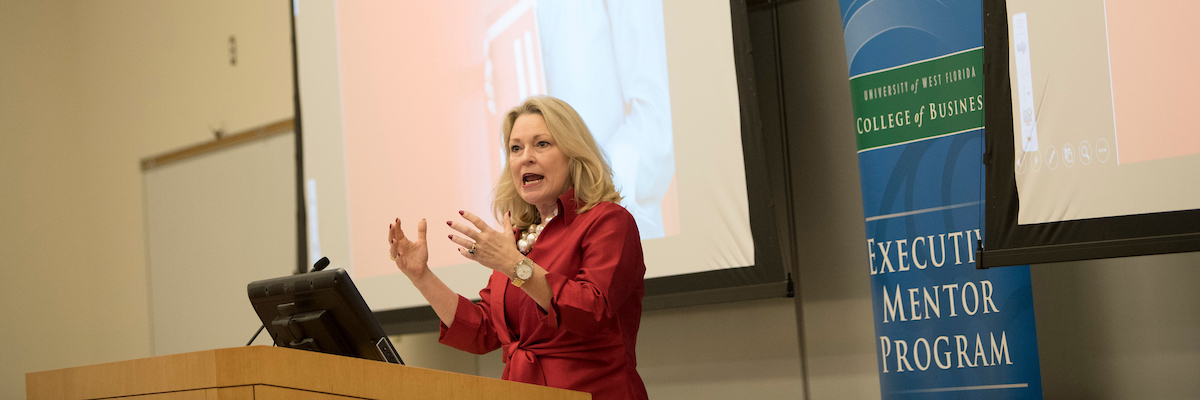Author: Advocacy Can Be Powerful Tool in Changing Business Environment
Pensacola – In a quickly evolving business environment, author and public relations expert Karen B. Moore believes the time of simply relying on your product to speak for your company are over.

“It’s no longer good enough to have a good product,” Moore said. “You have to use every tool available to you because if you don’t, your competition will.”
Moore, founder and CEO of Moore Communications Group and author of “Behind the Red Door: Unlock Your Advocacy Influence and Success,” spoke Jan. 31 at the University of West Florida College of Business as part of the Wells Fargo/UWF Executive Mentor Program Lecture Series.
Moore said advocacy is recruiting and using champions to support your brand.
“It’s something that has been done in public affairs for a very long time with people mobilizing behind an issue. But that same energy can be brought to a company,” she said. “Businesses need to engage their audience, and they can influence their buying decisions. It’s a two-way conversation.”
Advocacy is something every business needs to engage in – even those with an established brand, Moore said.
“In today’s environment, every business is a startup,” Moore said. “Building advocacy is about being the most strategic with limited resources.”
It’s also important not to become stagnant.
“Every 12-18 months, you need to do a brand assessment,” Moore said. “Ask people what the first word that comes to mind is and see if that aligns with what you want your brand to be.”
Moore said social media is the most powerful tool businesses have to build advocacy.
“We no longer do digital marketing,” she said. “We do marketing in a digital world.”
That digital world has a huge influence in the way people perceive not only brands, but also the world.
“Seventy percent of consumers now purchase products based on content they’ve seen on Facebook,” Moore said. “In a recent survey of the capitol press corps in major cities, 80 percent said they decide what stories to write about based on what they read on Twitter.”
Moore offered her own rule of three for marketing in the digital age.
“First, you need three facts about your business that you can share. People can focus on around three facts before they lose interest,” she said. “You also need three stories about your brand to make an emotional connection. And finally, you need to be active on three social media platforms.”
She also noted three guiding principles she has applied to her own business successfully and suggests.
“When I began, I set these hallmarks for myself. First, you will do the right thing,” she said. “Second, be innovative. And finally, talk about how good and innovative you are.”



